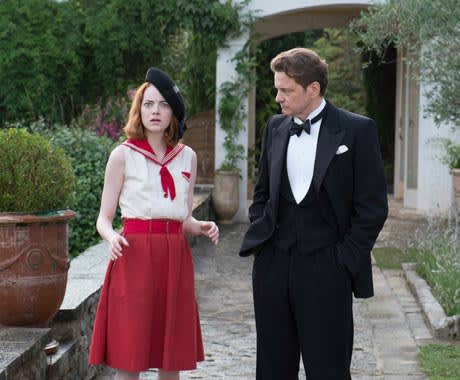Stuffy, logic-obsessed Stanley Crawford, who performs in costume as Chinese illusionist Wei Ling Soo, takes on a mission to debunk a beautiful young American mystic in the south of France. Follies ensue, the dead are summoned, attractions occur, disbelief is suspended and bon mots are on offer.
If you didn't know Magic in the Moonlight was a Woody Allen film by that description alone, I'm not sure what's wrong with you.
It's impossible to watch a contemporary Woody Allen film without comparing it to the best work in his expansive filmography. He is prolific on a level that few have ever been, and because of that, his work hardly ever feels rare or singular anymore. Because he makes a feature film every 17 minutes (give or take), it's hard to get a sense of what Allen is interested or invested in — save for those years he decided Scarlett Johansson was his muse. These days, all we know for sure is that Woody Allen is in love with Europe (Still? Again?), and that his European characters have interesting relationships with and to Americans (see Midnight in Paris, Vicky Cristina Barcelona, Match Point, To Rome With Love, etc.).
Magic in the Moonlight isn't Woody Allen's best or funniest film, but there are certainly lovely moments: Colin Firth being stuffy, disdainful, dismissive, and irascible as if the only direction Allen provided was "play Mr. Darcy, but harder"; Hamish Linklater as a love-struck and schmaltzy rich guy; and Eileen Atkins (as Stanley's beloved Aunt Vanessa) being delightful, and stealing every scene she's in.
Thing is, I went to see Magic in the Moonlight for America's newest Sweetheart, Emma Stone. We're told her Sophie, whom Stanley is sent in to debunk, has gifts aplenty, but she doesn't seem that gifted. Just pretty and charming. Is Allen's point that a beautiful woman's charms are the same thing as being magical to weak-kneed men? Fuck, I hope not.
Stone, for all her gifts (as an actor), brings a flatness to the role that disrespects it. She is, I think, meant to be a cross between the all-seeing/all-knowing whatever and the girl-next-door and instead she plays it (no doubt thanks to a lapse in Allen's writing) like she's walking around and waiting for exposition to happen. A film of this nature needs its co-leads (i.e. Firth and Stone) to carry it, to lift it heavenward. Firth seems fit to the task, but Stone, regrettably, is sleepwalking. It's a pity, as what might have been a worthwhile, witty romp plays as predictable as a paint-by-numbers summer action flick. Quel dommage.
(Mongrel Media)If you didn't know Magic in the Moonlight was a Woody Allen film by that description alone, I'm not sure what's wrong with you.
It's impossible to watch a contemporary Woody Allen film without comparing it to the best work in his expansive filmography. He is prolific on a level that few have ever been, and because of that, his work hardly ever feels rare or singular anymore. Because he makes a feature film every 17 minutes (give or take), it's hard to get a sense of what Allen is interested or invested in — save for those years he decided Scarlett Johansson was his muse. These days, all we know for sure is that Woody Allen is in love with Europe (Still? Again?), and that his European characters have interesting relationships with and to Americans (see Midnight in Paris, Vicky Cristina Barcelona, Match Point, To Rome With Love, etc.).
Magic in the Moonlight isn't Woody Allen's best or funniest film, but there are certainly lovely moments: Colin Firth being stuffy, disdainful, dismissive, and irascible as if the only direction Allen provided was "play Mr. Darcy, but harder"; Hamish Linklater as a love-struck and schmaltzy rich guy; and Eileen Atkins (as Stanley's beloved Aunt Vanessa) being delightful, and stealing every scene she's in.
Thing is, I went to see Magic in the Moonlight for America's newest Sweetheart, Emma Stone. We're told her Sophie, whom Stanley is sent in to debunk, has gifts aplenty, but she doesn't seem that gifted. Just pretty and charming. Is Allen's point that a beautiful woman's charms are the same thing as being magical to weak-kneed men? Fuck, I hope not.
Stone, for all her gifts (as an actor), brings a flatness to the role that disrespects it. She is, I think, meant to be a cross between the all-seeing/all-knowing whatever and the girl-next-door and instead she plays it (no doubt thanks to a lapse in Allen's writing) like she's walking around and waiting for exposition to happen. A film of this nature needs its co-leads (i.e. Firth and Stone) to carry it, to lift it heavenward. Firth seems fit to the task, but Stone, regrettably, is sleepwalking. It's a pity, as what might have been a worthwhile, witty romp plays as predictable as a paint-by-numbers summer action flick. Quel dommage.




